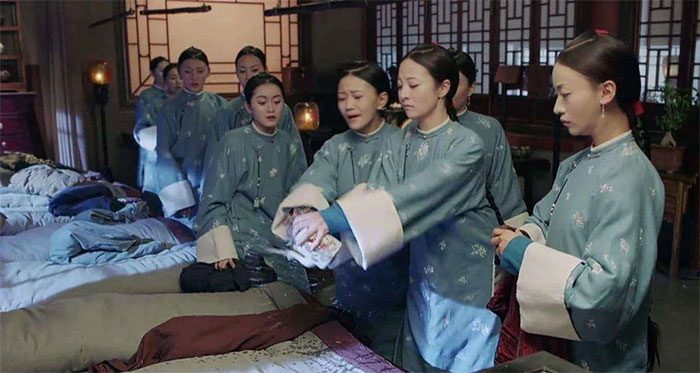During the feudal era, the palace maids serving in the royal palace were divided into two ranks. The highest rank consisted of maids who served the emperor directly, enjoying a relatively easy workload and high benefits. The other rank comprised maids who performed arduous manual labor.
Not only were they “exploited” for their labor, but any minor mistake could lead to severe punishment for these lower-ranked maids. What evokes the most sympathy from later generations for these maids is a peculiar regulation from the court: Maids were required to sleep on their sides!

Lower-ranked maids in ancient times had to work very hard. (Image: Baidu)
In the book “Memoirs of a Palace Maid”, author Hà Vinh Nhân (who once served as a palace maid in the Forbidden City) wrote: “According to the regulations of the Qing dynasty, palace maids were not allowed to lie on their backs when sleeping; they had to curl their legs and lie on their sides.”
“For the arms, one arm must be tightly clamped between the legs, while the other rests on the body. If one arm becomes numb, they could switch the position of their arms, but the posture must remain unchanged.” Why was there such a strict rule?
1. Saving Space
Although the imperial palace was vast, it housed a large number of people. Most of the spacious and elegant palaces were reserved for the emperor and his consorts. The servants working in the palace, despite their large numbers, were only allocated just enough space for living and sleeping.
Due to the cramped living conditions, the maids could not have separate beds. Therefore, they had to sleep collectively on a long bed. To help save sleeping space, all maids were required to sleep on their sides.
2. The Superstitious Beliefs of the Emperor
Feudal emperors always regarded themselves as “Son of Heaven” and believed they received protection from the heavens and deities. Thus, they had to maintain a respectful attitude towards the divine at all times. According to these emperors, not only themselves but everyone living and working in the palace had to uphold a sense of reverence towards the divine.
Therefore, even while sleeping, maids were required to maintain the most dignified sleeping posture, so as not to offend the heavens. The act of sleeping on one’s back, facing upwards, was considered disrespectful to the supreme being. This was one of the reasons behind the perplexing regulation that maids had to sleep on their sides.
3. Preventing the Maids from Sleeping Well
Part of the essence of this regulation was to ensure that the maids remained conscious of their lowly status, reminding them of their mission every hour and minute. Additionally, there was another reason: to prevent them from sleeping well.

The nature of their work, regardless of day or night, meant that the maids could not sleep well! (Image: Baidu).
The work of the palace maids was incredibly arduous, regardless of day or night. However, sleep is a physiological need that cannot be neglected; no one can work continuously day and night. Therefore, to serve their masters well, the maids had to work in shifts, taking turns to be on duty. When it was their turn, they had to move to their master’s palace as quickly as possible, with no delays allowed.
The regulation requiring them to sleep on their sides also served the interests of their masters in the palace. Why is that?
We all know that maintaining a single sleeping position is extremely uncomfortable. This significantly affected the quality of sleep for the maids, preventing them from sleeping well. And only when they could not sleep well could they be easily awakened and quickly reach their workplace.





















































